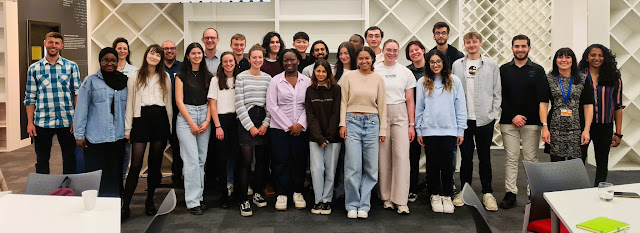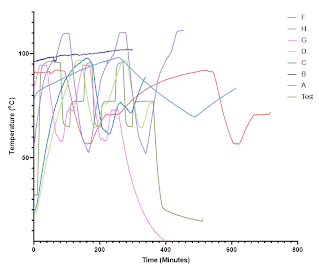Group work skills are an essential element of engineering education, and one of the key differentiators between engineering and science degrees. No doubt, a good science degree program will include learning these skills, after all they enhance employability, but for engineers working in teams to solve problems is core. Learning and practicing group work skills an essential part of engineering education.
 |
| Networking with students, industry representatives and staff |
For third year MEng Biomedical Engineering students, the pitch presentation is the culmination of a year of hard work who have worked on a group design and build module. The module is designed to give the students an opportunity to practice and perfect team working skills and it brings together students from all four of the Biomedical Engineering specialisms into teams. Each team was assigned the task of building a PCR machine within a budget of £250 and a time constraint of two semesters. The project is a great example of practical engineering education; of learning by doing.
 |
| The PCR Machines |
Although the production of a final working system isn’t the focus of the module assessment, it is the focus of the teams as they work together towards the deadline, and year on year, the results are impressive. The standards in the 22-23 cohort were high, with each team producing a unique and innovative system that met stretch goals. These included remote monitoring over a network, sample tube choice and progress light indicators, visual displays, and interfaces for user control. Precise, accurate and timely temperature control of an aluminium PCR block is a deceptively difficult task, especially when restricted to 12 v and a small time and money budget, but all the teams achieved this to some extent (see plot!). The systems also included safety and accessibility features. A huge amount was achieved by each team and each system had unique strengths. |
A trace tells a thousand stories.
Not all of them end well. |
The module serves as a platform to showcase engineering skills, effective teamwork, bright ideas, and hard work. It is wonderful to witness the students overcome challenges and grow in confidence over the course of the year.
During the pitch presentation assessment, we were joined by members from the Bioengineering Industrial Advisory Board, including representatives from Terumo Aortic, SleepCogni, Objectiv- X, and the NHS. They were impressed by the exceptional quality of work and the engaging presentations delivered by the students.
This type of module presents good challenges to the students and the teachers, and is a very powerful tool for experiential learning.